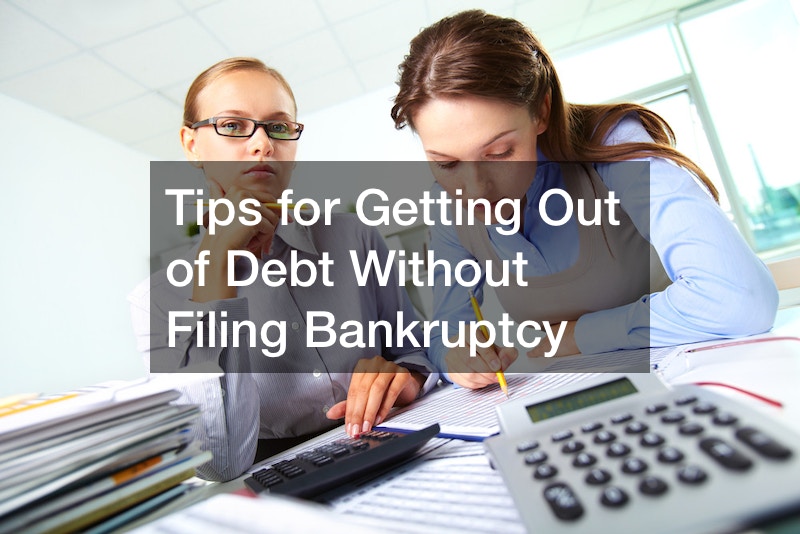Tips for Getting Out of Debt Without Filing Bankruptcy


Getting out of debt can be a daunting and overwhelming task, especially if you are considering bankruptcy as a potential solution. However, there are other options available that can help you get out of debt without resorting to bankruptcy. In this article, we will discuss some tips for getting out of debt without filing bankruptcy, including financial analysis, seeking the help of a tax accountant or bankruptcy attorney, and making changes to your spending habits.
Tip 1: Conduct a Financial Analysis

Before you can effectively tackle your debt, it is important to understand exactly where you stand financially. This means conducting a thorough financial analysis to identify all of your debts, income, and expenses. This includes things like student loans, credit card balances, and so on. You can use a personal budgeting tool or work with a financial planner to help you get a clear picture of your financial situation. This will allow you to prioritize your debts and come up with a plan to pay them off.
Bankruptcy is often seen as a last resort for individuals and businesses struggling with debt. However, it is important to understand that bankruptcy is not always the best or only option for getting out of debt. In fact, there are several reasons why you may want to consider alternatives to bankruptcy.
First and foremost, bankruptcy can have serious and long-lasting consequences. Filing for bankruptcy can negatively impact your credit score and make it difficult to obtain loans or credit in the future. It can also have personal and emotional consequences, as it can be a stressful and embarrassing process.
Furthermore, bankruptcy may not always be the most effective solution for getting out of debt. While it may provide some relief in the short-term, it does not address the underlying financial issues that led to the debt in the first place. As a result, it is possible for individuals to end up in debt again after filing for bankruptcy.
Getting out of debt without filing bankruptcy is not impossible. There are alternative options available for individuals and businesses struggling with debt. For example, it may be possible to negotiate lower interest rates with creditors or consolidate debts to make them more manageable. There are also government programs and nonprofit organizations that offer assistance with debt management and financial planning. Bankruptcy attorneys can become expensive as well.
In conclusion, bankruptcy should not always be viewed as the only solution for getting out of debt. While a bankruptcy service and lawyers might be helpful for some people, it is important to explore all available options and consider the long-term consequences before making a decision. With the right strategies and support, it is possible to get out of debt and take control of your financial future without resorting to bankruptcy.
Tip 2: Seek Professional Help
If you are struggling to get out of debt on your own, it may be helpful to seek the assistance of a professional. A tax accountant can help you identify any tax deductions or credits that you may be eligible for, which can help reduce your overall debt burden. A bankruptcy attorney can provide guidance on the bankruptcy process and help you determine if it is the right option for you. Medicaid planners can help you navigate the complex rules and regulations surrounding Medicaid and identify strategies for reducing your debt.
Additionally, a financial planner or counselor can help you create a budget and debt repayment plan that is tailored to your specific financial situation. They can also provide guidance on how to increase your income and reduce your expenses to better manage your debt.
Another option is to work with a debt settlement company or debt consolidation company. These companies can negotiate with your creditors on your behalf to reduce the amount of debt you owe or combine your debts into a single, more manageable payment. However, it is important to be cautious when working with these companies, as some may charge high fees or have questionable business practices.
Finally, you may want to consider seeking assistance from a nonprofit organization or government agency. Nonprofit organizations, such as consumer credit counseling services, can provide free or low-cost debt management and financial planning services. Government agencies, such as the Department of Housing and Urban Development, may also offer programs and resources for individuals struggling with debt.
Overall, there are many resources and professionals available to help you get out of debt. By seeking assistance and exploring all of your options, you can find the solution that works best for your unique financial situation.
Tip 3: Make Changes to Your Spending Habits

One of the most effective ways to get out of debt is to change your spending habits. This may involve cutting back on unnecessary expenses, such as dining out or entertainment, and redirecting that money towards paying off your debts. You should also consider negotiating lower interest rates with your creditors or consolidating your debts to make them more manageable. In addition, it is important to make a budget and stick to it to ensure that you are not adding to your debt burden.
One key aspect of changing your spending habits is understanding where your money is going. This means tracking your expenses and identifying areas where you may be overspending. For example, you may find that you are spending a significant amount of money on dining out or subscription services that you no longer use or need. By cutting back on these types of expenses and redirecting that money towards paying off your debts, you can make a significant dent in your debt balance and be well on your way to getting out of debt without filing bankruptcy.
Another important aspect of changing your spending habits is developing a budget and sticking to it. A budget can help you better understand your financial situation and make informed decisions about your spending. It can also help you prioritize your debts and allocate funds towards paying them off. By following a budget, you can ensure that you are not adding to your debt burden and are instead working towards paying off your debts.
In addition to cutting back on expenses and creating a budget, you may want to consider negotiating lower interest rates with your creditors or consolidating your debts. By negotiating lower interest rates, you can reduce the amount of money you pay in interest over time, which can make it easier to pay off your debts. Debt consolidation involves combining multiple debts into a single loan with a lower interest rate, which can also make it easier to manage your debts. This is a fast path to getting out of debt without filing bankruptcy.
Overall, changing your spending habits is a crucial step in getting out of debt. By cutting back on unnecessary expenses, creating a budget, and considering debt consolidation or lower interest rates, you can take control of your finances and work towards paying off your debts.
Tip 4: Avoid High-Risk Activities

Certain activities, such as gambling at a casino or making large purchases on credit, can significantly increase your odds of not getting out of debt without filing bankruptcy. It is important to avoid these types of activities while you are working to get out of debt. Instead, focus on building your savings and paying off your debts. If you do need to make a large purchase, consider paying for it in cash or using a low-interest credit card.
Gambling, particularly at a casino, can be a significant source of debt for some individuals. While it may seem like an enjoyable and potentially lucrative activity, the odds are often stacked against the player and it can be easy to get caught up in the excitement and risk more money than you can afford to lose. If you have a history of gambling or struggle with addiction, it is important to avoid this type of activity altogether while you are working to get out of debt.
Making large purchases on credit can also increase your debt burden, particularly if you do not have the means to pay off the balance in full each month. Getting out of debt without filing bankruptcy is almost impossible if you’re used to paying for things on credit without paying off your card each month. Interest charges can quickly add up, making it more difficult to pay off your debts. If you do need to make a large purchase, consider paying for it in cash if you have the funds available. Alternatively, you can use a low-interest credit card to minimize the amount of interest you pay over time.
Instead of engaging in activities that can increase your debt burden, it is important to focus on building your savings and paying off your debts. This may involve cutting back on expenses and redirecting that money towards debt repayment or increasing your income through additional work or side hustles. By building your savings, you can create a financial cushion that can help you weather any unexpected expenses or setbacks.
In conclusion, certain activities, such as gambling and making large purchases on credit, can significantly increase your debt burden. For getting out of debt without filing bankruptcy, it is important to avoid these types of activities and instead focus on building your savings and paying off your debts. If you do need to make a large purchase, consider paying for it in cash or using a low-interest credit card to minimize the impact on your debt.
Tip 5: Take Care of Your Assets

Your assets, such as your car or home, can also contribute to your debt burden if you are not careful. To minimize this risk, it is important to properly maintain your assets and keep them in good working order. This may involve regularly scheduled car maintenance or home repairs. By taking care of your assets, you can reduce the need for expensive repairs or replacements, which can add to your debt.
Properly maintaining your assets, such as your car and home, is important not only for their longevity and value, but also for minimizing your debt burden. When you neglect to properly maintain your assets, it can lead to costly repairs or replacements down the line. For example, failing to regularly maintain your car can lead to major mechanical issues that can be expensive to fix. Similarly, ignoring home repairs can lead to more significant and costly problems, such as a leaking roof or faulty plumbing.
To minimize the risk of your assets contributing to your debt burden, it is important to be proactive about maintenance. This may involve setting aside money each month for regular car maintenance or scheduling home repairs as needed. By taking care of your assets, you can reduce the need for expensive repairs or replacements and prevent them from adding to your debt.
In addition to regular maintenance, it is also important to be mindful of your asset-related expenses. For example, if you have a car loan, make sure to make your payments on time to avoid late fees and additional interest charges. Similarly, if you own a home, consider refinancing your mortgage to a lower interest rate to save money on interest charges over time. By being mindful of your asset-related expenses, you can reduce the impact on your debt burden.
Overall, your assets, such as your car and home, can contribute to your debt burden if you are not careful. To minimize this risk, it is important to properly maintain your assets and be mindful of your asset-related expenses. By taking these steps, you can reduce the need for expensive repairs or replacements and better manage your debt, and be on your path to getting out of debt without filing bankruptcy.
Conclusion
Getting out of debt without filing bankruptcy can be a challenging and time-consuming process, but it is possible with the right strategies and support. By conducting a financial analysis, seeking professional help, changing your spending habits, avoiding high-risk activities, and taking care of your assets, you can get out of debt without filing for bankruptcy. Remember to be patient and consistent in your efforts, as it may take time to see progress. With dedication and determination, you can get out of debt and take control of your financial future.


